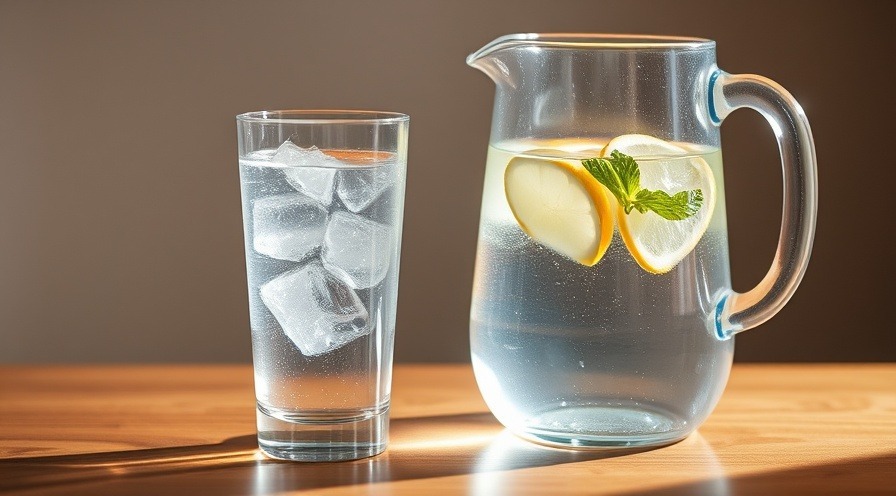
Tired, Anxious, Overwhelmed? Discover the 4 Root Causes You're Ignoring
Feeling like a deflated balloon filled with bees lately? You know, that delightful combo of fatigue, anxiety, and overwhelm? You’re not alone! Heidi from Happy Well Life gets it – these are the top complaints she hears from her clients. And guess what? While the internet might throw around vague terms like "mental/emotional disorders" and "infection" (seriously, thanks for that, WebMD!), Heidi dives deeper into the real nitty-gritty from a naturopathic and functional wellness perspective.
Now, before you resign yourself to a life of sighing dramatically and mainlining caffeine, hold your horses! Heidi’s here to tell you that these symptoms aren't just a "normal" part of modern life; they're clues that something deeper is going on in your amazing body.
And thankfully, she’s got the lowdown on four key areas that are often the real culprits. Think of it like this: your body is a complex machine, and these four things are like the oil, the battery, the air filter, and the fuel. If one of them is off, the whole thing sputters.
So, grab your favorite (hydrating!) beverage, settle in, and let's explore these foundational causes together. We'll even sprinkle in some wisdom from medical professionals and maybe a relatable story or two (because who doesn’t love a good "you're not crazy, it happens to me too" moment?).
The Mighty Power of H2O (and a Pinch of Salt!)
First up, let's talk about something so basic, it's almost revolutionary: hydration. Heidi rightly points out that our bodies are about 60% water (salty water, no less!). Even a tiny dip in those hydration levels can throw everything out of whack. Think of it – you wouldn’t expect your car to run smoothly on an empty gas tank, would you? Well, your body feels the same way about water!
Dehydration is sneakier than a ninja in a library, especially for busy folks who might forget to drink enough. Even mild dehydration can bring on fatigue, anxiety, overwhelm, headaches, and trouble concentrating or sleeping. Fun, right? When you're parched, your blood volume drops, meaning less oxygen and nutrients are delivered to your precious muscles and brain.
Hello, sluggishness and brain fog! Plus, it messes with your electrolytes, which are crucial for nerve and muscle function. This can even make you wobbly (especially important for our wise elders!) and trigger anxiety and mood swings. Nobody wants to be hangry and anxious – and sometimes, you’re just… thirsty!
Heidi is a big fan of adding daily electrolytes and sea salt to your water. She recommends brands like Ultima Replenisher and Hi-Lyte K1000. And let’s hear it for sea salt!
“Sea Salt has 72 minerals, including sodium, whereas table salt is just sodium chloride. Those 72 trace minerals used to come from mineral-rich spring water, but now our drinking water is filtered taking the minerals out of it. Sea salt dissolved in drinking water helps ionize the minerals, making them easier to absorb into the cells, pulling water in with them. Cells need water for their biochemical processes,”
says Dr. Carolyn Dean, M.D.. Heidi emphasizes that unlike processed table salt and high-sodium processed foods (which are definitely a “no bueno”), humans have thrived on sea salt for ages. It was even used as currency! And contrary to some outdated beliefs, sea salt doesn’t cause heart disease.

Root Causes of Being Thirsty (Even When You Don't Think You Are):
Lack of awareness: You might not feel thirsty until you're already dehydrated. Your body’s like that old car with a broken fuel gauge.
Diuretics: Caffeine and alcohol are sneaky culprits that increase urine output. That second (or third) cup of coffee might be dehydrating you!
Stress: Turns out, being stressed makes your body need more water. Talk about a double whammy!
Chronic conditions: Some health issues can lead to increased water loss.
Environment: Hot weather, high altitudes, and air travel all demand more water.
Actionable Steps to Quench Your Body's Thirst:
Drink up! Aim for half your body weight in pounds, in ounces of water per day, plus extra if you’re active or in a hot climate. For example, a 150-pound person should aim for 75 ounces (almost nine 8-ounce glasses).
Balance those diuretics: For every caffeinated or alcoholic drink, have an extra glass of water. It’s like damage control for your hydration levels.
Mineralize your water: Consider adding electrolytes or a pinch of sea salt.
Set reminders: Use apps or your phone to nudge you to drink regularly. Your future hydrated self will thank you.
Sweet Dreams: The Foundation of Feeling Fantastic
Next up, the magical land of sleep. Heidi calls it the foundation of health, and for good reason. It's during those precious hours that your body repairs itself, consolidates memories, and regulates hormones. Despite its vital role, many struggle with getting enough quality shut-eye. Heidi has even helped many of her clients significantly improve their sleep – take note!.
Your brain is a busy bee during the day, accumulating toxins. Sleep is when it takes out the trash, a crucial process for keeping your cognitive functions sharp. As the book Why We Sleep (highly recommended by Heidi) dives into, skimping on sleep means your body can't complete this detox, leading to both mental and physical fatigue.
Heidi and her husband have even started using Oura Rings to track their sleep patterns. It gives them insights into deep sleep, REM sleep, and nighttime awakenings. Heidi did her homework before choosing Oura over other trackers like Apple Watch, Garmin, and Woop, appreciating its unobtrusive design. She highly recommends a wearable health-tracking tool if you're curious about your own metrics. It's like having a tiny sleep scientist on your finger!

Why You Might Be Counting Sheep Instead of Sleeping Soundly:
Stress: A racing mind is not conducive to falling asleep. It’s like trying to watch a movie with a marching band in the background.
Technology: The blue light from screens before bed can mess with your melatonin, your sleep hormone. Put down the phone, people!
Poor sleep environment: Noise, light, and uncomfortable temperatures are sleep saboteurs. Your bedroom should be a cozy cave. Sleeping with pets can also disrupt your sleep. As much as you love Fluffy, maybe they need their own bed.
Nutrient deficiencies: Lack of magnesium, B vitamins, and other nutrients can impact sleep quality.
Late bedtimes: That "second wind" isn't your body telling you to keep working; it's meant for repair. Don't fall for its tricks!
Actionable Steps for Dreamland Domination:
Establish a sleep routine: Go to bed and wake up around the same time daily, even on weekends. Consistency is key!
Create a bedtime ritual: Wind down with relaxing activities like reading or a warm bath, and ditch the screens at least an hour before sleep.
Optimize your sleep sanctuary: Make it dark, cool, and quiet. Blackout curtains, earplugs, or a white noise machine can be game-changers. Heidi also loves her NodPod – worth checking out!.
Consider supplements: Magnesium can help relax your body for better sleep. Some studies suggest it can help older adults with insomnia. Taurine, an amino acid, might also be beneficial.
Taming the Stress Monster (Before It Eats You Whole)
Ah, stress – that ubiquitous feeling we all know and sometimes love (in small, manageable doses). Heidi explains that stress itself isn't always bad. Short bursts of stress followed by relaxation can actually be good for you. It’s like a mini workout for your system. This is hormesis, or as Heidi puts it, “Whatever doesn’t kill you makes you stronger”.
However, when stress becomes chronic without those crucial breaks, it can wreak havoc on your health. Constant fight-flight-freeze mode means prolonged exposure to cortisol. While cortisol is helpful in emergencies, consistently high levels can mess with your body and even interfere with melatonin production, disrupting your sleep. Sneaky, right?
Stress is a major precursor to feeling overwhelmed. Heidi highly recommends reading The Invisible Load by Dr. Libby Weaver, which helps you understand the often unseen burdens contributing to that overwhelmed feeling. You can grab the e-book on Amazon, or a physical copy from Dr. Libby’s website (it ships from New Zealand, so be patient!).
Guess what else the Oura Ring tracks? Stress levels! It uses various metrics to determine when you're stressed, sometimes even when you don't consciously feel it. When the app flags stress, Heidi takes a moment for box breathing or meditation, and her stress indicators often drop right down. Paying attention to self-care is also crucial for stress recovery. Heidi even has a free A-Z Self-Care Guide you can download.

Why Your Stress Levels Might Be Sky-High:
Overcommitment: Juggling too much without enough rest and recovery. Saying "yes" to everything can leave you feeling stretched thin.
Lack of boundaries: Difficulty saying no or setting limits. It’s okay to protect your time and energy!
Poor self-care: Neglecting your own needs in favor of others. You can't pour from an empty cup.
Nutrient imbalances: Chronic stress depletes essential nutrients like magnesium, vitamin C, and B vitamins, which are vital for managing stress.
Actionable Steps to Dial Down the Stress:
Practice mindfulness: Meditation, deep breathing, and yoga can significantly lower cortisol levels and reduce stress. Heidi even meditates daily with Roger Gabrial on Instagram.
Set boundaries: Learn to say no and prioritize your needs. When asked to do something, take a moment to check in with how it feels in your body. Trust your intuition!.
Incorporate stress-reducing activities: Regular exercise, time in nature, and hobbies can all help.
Support your body: Consider supplements like magnesium and adaptogens (like ashwagandha), which have shown promise in reducing stress and fatigue.
The Hidden Impact of Missing Nutrients
Last but certainly not least, let's talk about nutrient deficiencies. Heidi emphasizes that these are surprisingly common, even for those who try to eat healthily. Shockingly, around 90% of Americans are deficient in at least one vital nutrient! As the saying goes, "Garbage in, garbage out." If you're not fueling your body with the necessary building blocks, it simply can't function optimally, leading to fatigue, anxiety, and overwhelm.
If you're serious about your health, Heidi recommends diving into Dr. Carolyn Dean’s book Magnesium: The Missing Link to Total Health. Certain nutrients are particularly crucial for managing fatigue, anxiety, and overwhelm, and magnesium is a star player.
Magnesium: Involved in over 300 biochemical reactions (and a whopping 80% of bodily actions!), including those that regulate stress and sleep. Low levels are linked to increased anxiety, poor sleep, and heart disease. "Magnesium is essential for over 300 biochemical reactions, (and 80% of bodily actions) including those that regulate stress and sleep," notes Dr. Carolyn Dean..
Heidi advises against magnesium oxide (unless you're constipated as it's poorly absorbed) and recommends well-absorbed forms like magnesium taurate (for heart health), magnesium L-threonate (for brain health), and magnesium glycinate or citrate. She personally uses Dr. Dean’s liquid ReMag and other professional brands.
Vitamin D: Supports immune function, mood, and bone health. Deficiency is common, especially in areas with limited sunlight, and is linked to a higher risk of depression and more frequent colds/flu. Aim for a level between 50-80 ng/dL. Important note: you need adequate magnesium for Vitamin D to be properly utilized.
B Vitamins: Key for energy production, brain health, and stress management. A deficiency, especially in B12, can lead to fatigue, brain fog, and mood issues. Take B vitamin supplements in the morning as they can be energizing.
Iron: Necessary for carrying oxygen in your blood. Iron deficiency can cause anemia, leading to persistent fatigue and weakness. Heme iron from meat is more easily absorbed than plant-based iron. Consider a multi-organ supplement like CODEAGE Grass-fed Beef Organs as a good source.

Why Your Nutrient Tanks Might Be Running Low:
Poor diet: Processed foods are often nutrient-poor.
Stress: Chronic stress depletes key nutrients, especially magnesium and B vitamins. Stress can even reduce digestive secretions by up to 90%, making it harder to absorb nutrients. Talk about a vicious cycle!
Gut health issues: Poor digestion can hinder nutrient absorption, even with a good diet.
Medications: Some medications can interfere with nutrient absorption or increase your needs.
Actionable Steps to Nourish Your Body from Within:
Get tested: Work with a wellness practitioner to identify any deficiencies through blood tests. Heidi offers blood lab packages.
Prioritize real, whole foods: Focus on a diet rich in vegetables, fruits, lean proteins, and healthy fats.
Support digestion: Improve gut health with probiotics, digestive enzymes, and fiber-rich foods.
Putting It All Together: A Story of Transformation (No Actual Names, Promise!)
Let's imagine Sarah (not her real name, of course, for privacy reasons!). Sarah came to Heidi feeling constantly exhausted, riddled with anxiety, and like she was drowning in her daily tasks. She’d been told it was “just stress” and maybe she needed to “relax more” (easier said than done, right?).
Through Heidi's guidance, Sarah started by focusing on drinking more water and adding electrolytes. She noticed a slight improvement in her energy levels within a week. Next, they tackled her sleep. Sarah implemented a bedtime routine, ditched her phone an hour before bed, and made her bedroom a dark and quiet oasis. Slowly but surely, she started falling asleep more easily and waking up feeling more refreshed.
They also addressed Sarah’s chronic stress. She began incorporating short mindfulness exercises throughout the day and learned to say “no” to extra commitments that weren't serving her. This made a huge difference in her feelings of overwhelm.
Finally, after some blood work, they identified a magnesium deficiency. With targeted supplementation (the right kind!), along with a diet richer in whole foods, Sarah’s anxiety levels decreased, her energy soared, and she felt more in control of her life. While this isn't a formal "case study" with all the scientific bells and whistles, it reflects the patterns Heidi sees with clients when these fundamental areas are addressed.

Your Journey to Feeling Awesome Starts Now!
Addressing these root causes – hydration, sleep, stress management, and nutrient deficiencies – can truly transform your health and quality of life. Remember, small changes can add up to big results. Heidi suggests picking one or two actionable steps from this article and seeing how they affect your well-being.
Before you go wild with supplements, Heidi advises checking your blood labs first. Often, low digestive enzymes and stomach acid can hinder nutrient absorption anyway. So, sometimes, optimizing your digestion is a fantastic first step.
Feeling empowered to take back your health? We hope so! Now, what’s your biggest takeaway from this article?
 Add Row
Add Row  Add
Add 




 Add Row
Add Row  Add
Add 

Write A Comment